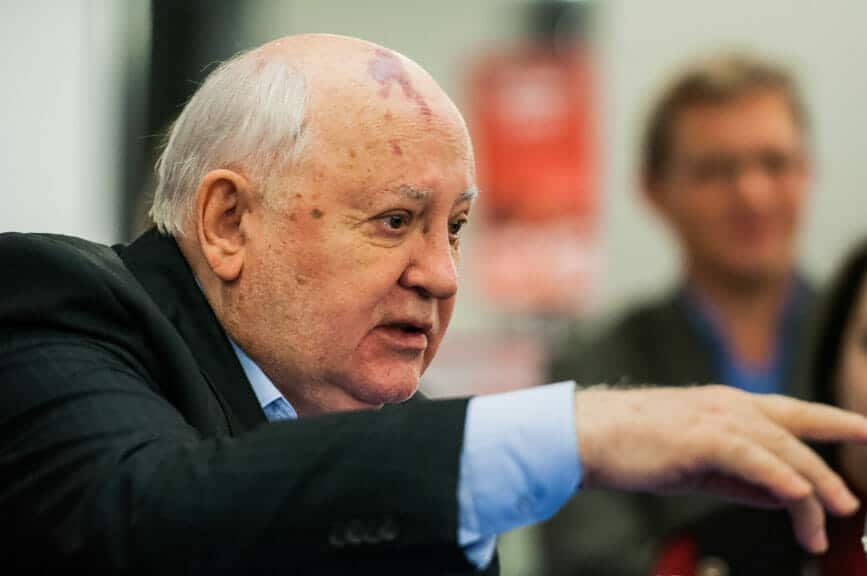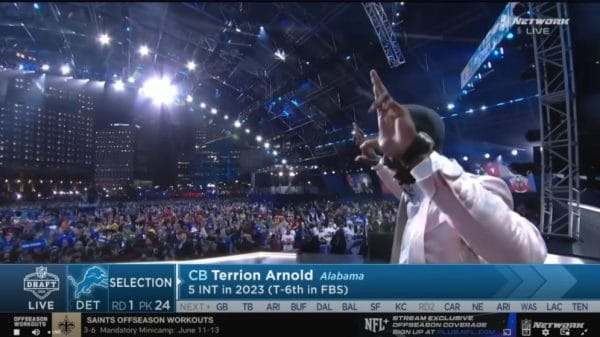Mikhail Gorbachev’s death marks the end of a dark era in human history, wherein the threat of nuclear war remained a very real possibility for those who lived through it. While his Presidency remains controversial, there is no denying the impact he had on both Russia and international politics.
Who Was Gorbachev?
Mikhail Sergeyevich Gorbachev was born in March 1931 to a poor family under Stalin’s rule of the Soviet Union. Mikhail’s childhood took place during one of the bleakest times in the USSR, beginning with the Soviet famine of 1930-1933, and followed by the Great Purge, wherein perceived “enemies” were arrested and placed in Gulags. As a child, Gorbachev excelled at academics and proved his gifted intelligence to his peers, and he went on to study law at Moscow State University in 1950. In 1955, and began working in Stavropol, where for the next ten years he would work his way up the administrative ladder until he became the First Secretary of Stavropol by 1970. Here, he would concentrate on increasing agricultural production in the region, and made a network of connections with other likeminded individuals. His effective leadership in this position, (as well as a lot of brown-nosing up to Brezhnev), would prove significant in his later rise to power.
In 1978, Mikhail was given the position of Secretary of the Central Committee, and he became a full member in 1980. For the next four years, Gorbachev would work to become one of the most active and valued members of the Committee, and became a likely successor to Konstantin Chernenko when he was appointed as Genaral Secretary in 1984. Just over a year later, Gorbachev would take this position, following the death of Chernenko, at the age of 53.
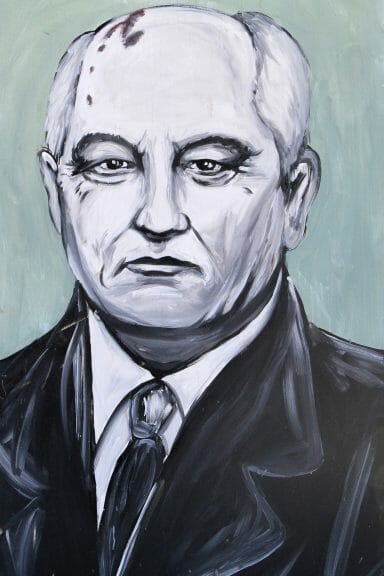
Credit: Photoprofi30 / Shutterstock
The Cold War
Before looking at Gorbachev’s government, it is important to understand the context surrounding his leadership. When World War 2 ended in 1945, a new global conflict emerged, one which had no official battles fought: the Cold War. Nations were divided between East and West, with the USSR and the US at the head of each respective side, each rapidly building up their nuclear arsenal in an attempt to intimidate the other. As a result of this arms race, for 45 years the world sat in perpetual fear of nuclear warfare and the potential end of the human race. This constant anxiety over the possibility of MAD (Mutually Assured Destruction) impacted countries everywhere economically, politically, socially, and culturally. Films such as On the Beach and Dr Strangelove or How I Learned to Stop Worrying and Love the Bomb helped to exemplify the existential terror many felt towards this sense of inevitable annihilation.
Following the victory of the Allies, Berlin was divided up into four territories between the French, the British, the Americans, and the Soviets. While the UK, France, and America would soon unite their respective regions, the divide between East and West Berlin remained. This division was solidified with the creation of the Berlin Wall in 1961, a heavily guarded barrier between the two sides, with anyone who attempted to cross it being gunned down. So-called “Proxy Wars” began to emerge, most notably in Korea during the 1950s; Vietnam in the 60s, and Afghanistan in the 80s. Countries from both the East and West would finance and arm foreign nations in their wars, depending on which side was closer to their own political ideals. The Cuban Missile crisis in 1962 marked the “hottest” event of the Cold War, wherein Russian nuclear warheads were shipped to Cuba, leading to what seemed like an imminent nuclear attack. Fortunately, JFK managed to keep his head (he failed to do so a year later), and was able to diffuse the situation.
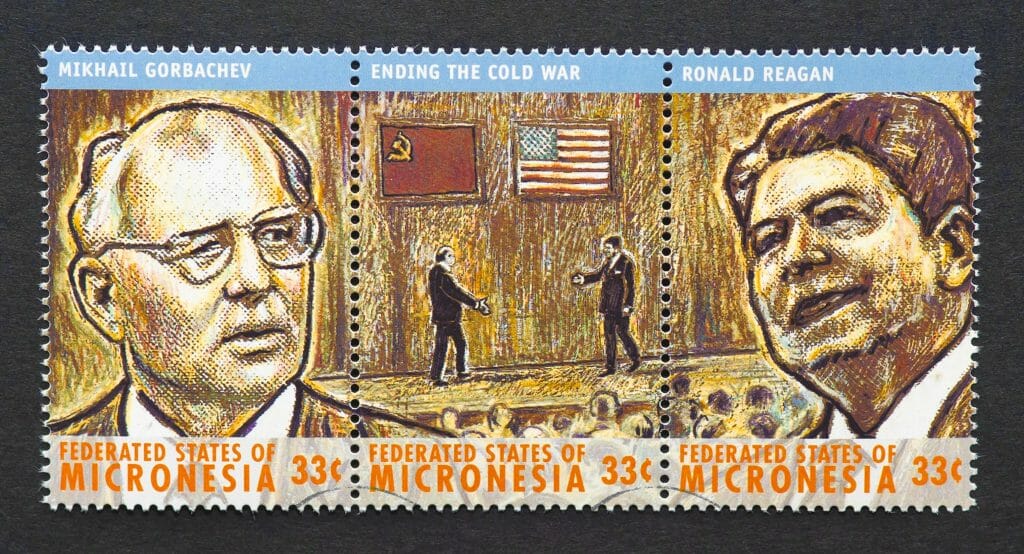
Credit: catwalker / Shutterstock
Gorbachev’s Leadership & The End of the USSR
When Gorbachev took power in 1985, he quickly established himself as a very different type of leader than his predecessors. Gorbachev’s most significant policy was that of гласность (“glasnost” or “openness”), where the Soviet government would relax its grip over media, politics, and freedoms. This allowed for the press and broadcasting freedom to express their criticisms, and for individuals to voice their opinions much more openly, regardless of whether or not they were in line with Communism. More democratic systems were introduced to the country, such as multicandidate elections and secret ballots. In terms of international politics, Gorbachev sought to de-escalate the Cold War, reducing tensions between America and Russia. Ronald Reagan, the then-President of the US, would form a close relationship with Gorbachev over time as the two engaged in numerous talks between 1986 and 1991 over nuclear disarmament and reforms to the Russian political system.
In November 1989, the government of East Germany would (semi-accidentally) announce that Berliners would be allowed to cross the wall. Almost immediately the news would spread, and residents on both sides of the wall, nicknamed Mauerspechte, or “wallpeckers”, would take off parts of the wall as souvenirs, leading to the several sections of the wall being bulldozed to reconnect roads as unofficial border crossings. Just under a year later, Germany would be officially reunified on October 30 1990, which many declared to be the end of the Cold War.
In July 1990, hard-line Communists would criticize Gorbachev’s reforms and perceived liberalism, as well as his recent plans of decentralization and limited privatization, which Mikhail described as “modern socialism”. A series of events following this would lead to Gorbachev’s approval ratings plummeting, and in 1991 the attempted August Coup took place as radical Communists attempted to take control of the country through force. Gorbachev was held captive from August 19th to August 21st, though the coup backfired, losing much support for the hard-line communist cause, all but ensuring the collapse of the USSR. On the 29th of December that year, Gorbachev announced his resignation as leader. On New Years Eve of 1991, the Soviet Union officially came to an end.
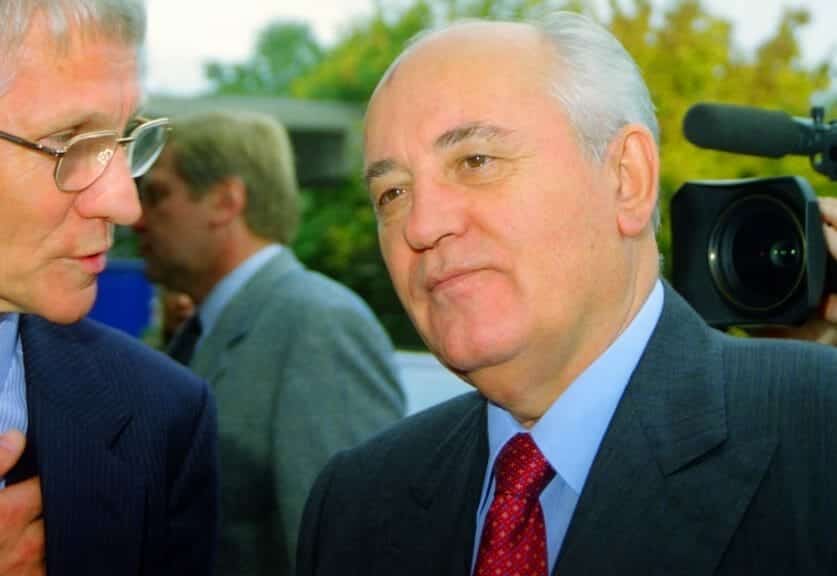
Credit: Heide Pinkall / Shutterstock
The Death of Gorbachev
After Gorbachev’s resignation, he would form the Gorbachev Foundation, which focused on Socio-Economic and Political Studies, and would tour internationally to give lectures, as well as publishing his memoirs. In addition to these, Gorbachev would, like Donald Trump, star in cheesy TV commercials for a high price. He remained involved in the world of politics, frequently criticizing Boris Yeltsin during his Presidency, and launching a Presidential campaign in 1996 which failed. While initially supportive of Putin’s leadership, Gorbachev would gradually become more critical of his authoritarian government, and reportedly was upset by rising tensions in recent years.
On August 30th, Gorbachev died at the age of 91 following over a decade of health problems, such as diabetes, pneumonia, and kidney problems. Like that of Thatcher and Reagan, his death has been received with a mixture of emotions, reflecting the divisive political scene of the 1980s and its leaders. While many Western countries admire his reformist policies advocating democracy and a more liberal beliefs, domestically, many Russians view him as responsible for the end of the Soviet Union, leading to the ensuing economic collapse and decline of Russian influence. Putin has announced he will not attend the funeral due to having a “busy work schedule”, though this as a poor excuse. Putin’s policies, as well as the recent invasion of Ukraine, have largely undone Gorbachev’s progress in democratizing Russian politics and his support of freedom of the press. Despite this, however, Gorbachev’s impact remains undeniable, and his consistent championing of a free and democratic Russia is something which will hopefully become a reality.


